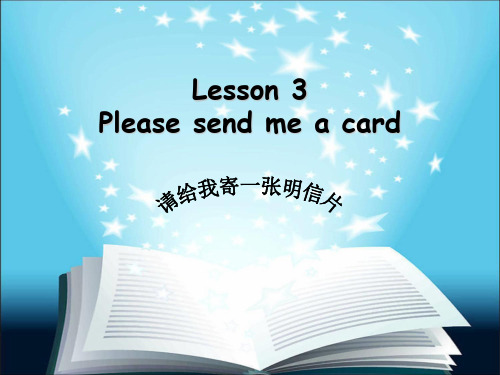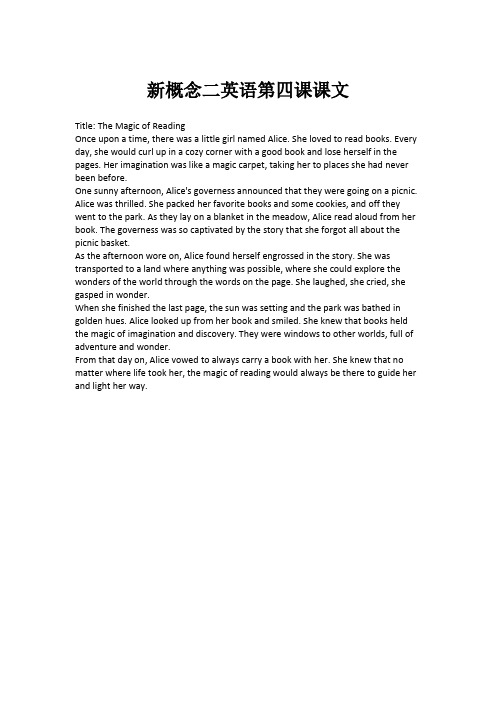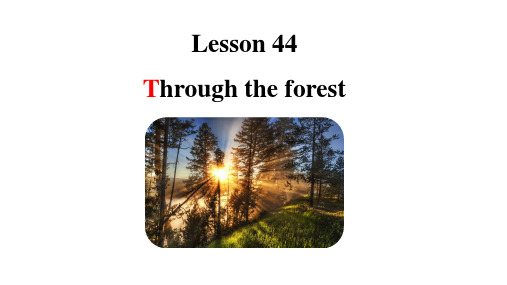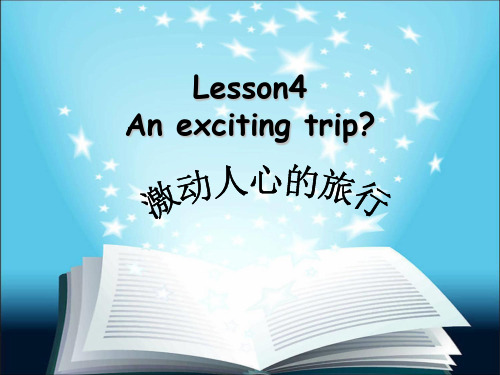新概念英语-第2册-第4课-Lesson-4-课件-PPT
完整版)新概念英语第二册lesson-4(含课文、练习)

完整版)新概念英语第二册lesson-4(含课文、练习)b) Tim is an XXX。
2.What has Tim XXX?XXX.3.Where is Alice Springs?Alice Springs is a small town in the XXX.4.Where is Tim going after he visits Darwin?XXX.5.Why is Tim finding this trip exciting?Tim is XXX because he has never been abroad before.Tim works as an XXX Austrian company。
It is XXX is true een Tim working for an Austrian firm or a big firm。
but it is known that he works as an engineer。
The true statement is that Tim has been in Darwin for six months。
It is not his first timetraveling abroad。
as he is XXX is not in the center of Australia。
and there is no n given about Tim'XXXXXX。
Tim has been in Australia for six months。
and it is unclear how long he will stay。
His XXX。
XXX an Australian car。
but there is no n given about when he bought it。
Tim has never been to Alice Springs before。
新概念第二册Lesson3-lesson4完整版

Explain the text
• 1)a little Italian:语言不可数,所以要用 a little Italian 或 a few words of Italian • a little / little / a few / few 的区别: • a little / a few 都用肯定句,分别表示“有一点”和“有几 个”,但 a little 修饰不可数名 • 词;a few 修饰可数名词复数 • little / few 都用否定句,分别表示“没有多少”和“没有 几个”,但 little 修饰不可数名词; • few 修饰可数名词复数
spoil /spɔɪl/
• v. 损坏,破坏 (主要指精神上) • 过去式,过去分词:spoiled or spoilt Don't let him spoil your night The bad weather spoiled my mind • v. 宠坏,溺爱 He is a spoiled child. She spoiled her son by giving him too much money.
spend /spend/
• v. 用,花销 spend somemoney/sometime on sth / in doing sth spend 300 yuan on a new TV-set spend much time on sports I spend 10 years to learn English well. We spend 3 hours on the NBA final games last night.
这条小狗被宠坏了, 每天到处小便. piss
public /'pʌblik/ • 1)公共的:public school / place / house (pub 酒吧) • 2)反义词:private • 3)短语:in private 私下里的 ----- in public 公开的 • 例如:Why not have a conversation in public? • We are good friends in priv • • • • •
新概念英语第2册单词Lesson4:An exciting trip

新概念英语第2册单词Lesson4:An exciting trip exciting [k'satng] adj.令人兴奋的
【单词扩充】excited激动的
【单词搭配】exciting news令人激动的消息
【单词例句】
A:Our team won the match last night.
A:我们队赢下了昨天那场比赛。
B:That's exciting news.
B:这真是个令人兴奋的消息。
receive [r'siv] 接受,收到
firm [fm] 商行,公司
different ['df()r()nt] adj.不同的
【单词扩充】diverse不同的
【单词搭配】be different from 与……不同
【单词例句】
A:I'm almost sure that information was filed.
A:我几乎能够肯定,那份资料已经存档。
B:Would you like me to check again under a different heading? B:让我在别的标题下再查一查,好吗?
centre ['sent]n. 中心的
【单词扩充】 middle中间
【单词搭配】in the centre of在……中心
【单词例句】
A:I don't know how to use it.
A:我不知道它怎么用。
B:You can make a phone call to the centre for users. B:你能够给用户中心打电话。
abroad ['brd] adv. 在国外。
新概念二英语第四课课文

新概念二英语第四课课文Title: The Magic of ReadingOnce upon a time, there was a little girl named Alice. She loved to read books. Every day, she would curl up in a cozy corner with a good book and lose herself in the pages. Her imagination was like a magic carpet, taking her to places she had never been before.One sunny afternoon, Alice's governess announced that they were going on a picnic. Alice was thrilled. She packed her favorite books and some cookies, and off they went to the park. As they lay on a blanket in the meadow, Alice read aloud from her book. The governess was so captivated by the story that she forgot all about the picnic basket.As the afternoon wore on, Alice found herself engrossed in the story. She was transported to a land where anything was possible, where she could explore the wonders of the world through the words on the page. She laughed, she cried, she gasped in wonder.When she finished the last page, the sun was setting and the park was bathed in golden hues. Alice looked up from her book and smiled. She knew that books held the magic of imagination and discovery. They were windows to other worlds, full of adventure and wonder.From that day on, Alice vowed to always carry a book with her. She knew that no matter where life took her, the magic of reading would always be there to guide her and light her way.。
新概念英语第二册Lesson44——through the forest 课件

7.The men got such a fright that they dropped the bag and ran away. such +a/an+adj.+名词+that:如此以至于
8.'The strap needs mending,' said Mrs. Sterling later, 'but they did not steal anything.'
3.In the struggle, the strap broke and, with the bag in their possession, both men started running through the trees.
start+动名词(还有哪些动词+动名词呢?)
4.Mrs. Sterling got so angry that she ran after them. Steven如此有趣,以至于他交了很多朋友。 Steven is so interesting that he makes a lot of friends.
end trap
dge
ossession
ontents
reath isk
icnic
orest
L44
英文
1 think of the risk
2 run ... after 3 rush up to her 4 have a picnic 5 at the edge of a forest
6 in the struggle
(2) She continued to run. = She continued running.
新概念第二册ppt课件

• 以下短语中名词前不加冠词与加冠词意思有区别 • go to school 去上学; go to the school 去学校; • go to hospital去看病; go to the hospital去医院
3、I did not enjoy it. enjoy vt. 欣赏,享受,喜爱 ① enjoy +n. 喜欢,从当中得到一种享受(后面不能跟人) eg. I enjoy the music. enjoy the dinner\film\game ② enjoy oneself/代词 玩的开心 eg. We always enjoy ourselves. ③ enjoy +动名词 eg. Jane doesn’t enjoy swimming.
【课文讲解】
1、Last week I went to the theatre. • go to the +地点 表示去某地干什么事 • go to the theatre = go to the theatre to see a play去剧 场看戏 • go to the cinema =see a film 去电影院看电影
+ to sb. \ sth.
★business n. 事, 生意 • ① n. 生意 • businessman 生意人 • businesswoman • do business: 做生意 • go to some place on business:因公出差 eg. I went to Tianjin on business.
新概念英语第二册lesson 4课件--Infinite

_____________________________________(一般疑问句)
现在完成时
2. 含义:
表示一个动作到现在为止已经完成,并且对现在的状态有一定影响。
短暂性动词
表示一个动作从过去一直延续到现在。
延续性动词
现在完成时
短暂性动词---动作从开始发生到结束,持续时间很短。 E.g. Go out(灯熄灭), come, buy, borrow…
2、He has been there for six months.
• I have arrived in Beijing. (arrive 是瞬间动词不能和段时间连 用) • has been + in 地点 • He has been in Beijing for one year. • He has been in America for tow years.
attention
seat
single
theatre
museum
loudly
outside
send
ring-rang-rung
public
postcard
angry
New words and expressions
exciting
abroad
different
centre
现在完成时
1. 形式: have/has(助动词)+ done(过去分词) 否定句在助动词即have/has后加not, 变一般疑问句则将have/has 提前。 E.g. I have finished my homework. _____________________________________(否定句)
新概念英语第二册Lesson4课件

New words
firm n.商行,公司 law firm法律公司
公司
=company
different adj.不同的—— same相同的
adv. differently, n. difference
e.g. My coat is different from yours.
和…相同,一样
be the same with/as
--他们已经离开了,也就是说现在他们人不在这里
I have had my lunch.
--我已经吃过午饭了,也就是说我现在不饿
也可表示持续到现在的动作或状态。
He has learned English since 2001.
现在完成时与一般过去时的比较
1)一般过去时表示过去某时发生的动作或 单纯叙述过去的事情,强调动作;
yesterday.
6. There ___w_a__s(be) a telephone call for you just now. 7. When _d_i_d___ you _c_o__m__e(come) to China?
----Last year.
8. Yesterday I _t_h_o_u__g_h__t (think) that you were not in
现在完成时为过去发生的,强调过去的 事情对现在的影响,强调的是影响。
I saw this film yesterday. (强调看的动作发生过了。) I have seen this film. (强调对现在的影响,电影的内容已经知道 了。)
Grammar
2一般过去时常与具体的表示过去的时间状语连用; 现在完成时通常与模糊时间状语连用或无时间状语。
- 1、下载文档前请自行甄别文档内容的完整性,平台不提供额外的编辑、内容补充、找答案等附加服务。
- 2、"仅部分预览"的文档,不可在线预览部分如存在完整性等问题,可反馈申请退款(可完整预览的文档不适用该条件!)。
- 3、如文档侵犯您的权益,请联系客服反馈,我们会尽快为您处理(人工客服工作时间:9:00-18:30)。
New Lesson
An exciting trip I have just received a letter from my brother, Tim. He is in Australia. He has been there for six months. Tim is an engineer. He is working for a big firm and he has already visited a great number of different places in Australia. He has just bought an Australian car and has gone to Alice springs, a small town in the centre of Australia. He will soon visit Darwin. From there, he will fly to Perth. My brother has never been abroad before, so he is finding this trip very exciting.
现在完成时与一般过去时的比较
1)一般过去时表示过去某时发生的动作或 单纯叙述过去的事情,强调动作; 现在完成时为过去发生的,强调过去的 事情对现在的影响,强调的是影响。
I saw this film yesterday. (强调看的动作发生过了。) I have seen this film. (强调对现在的影响,电影的内容已经知道了。
flowers but I didn’t accept it.
take接受,收到 e.g. take the exam, take advice
New words
firm n.商行,公司 law firm法律公司
company公司
different adj.不同的—— same相同的
adv.differently, n. difference e.g. be different from
New words
exciting adj. 令人兴奋的(修饰事物)
excited 感到兴奋的(修饰人) -ed自己感到 interested, bored, relaxed
-ing令人感到interesting,boring,relaxing e.g. I am interested in this book. This is an interesting book.
Language points
1. I have just received a letter from my brother. 收到某人来信
get a letter from sb.
have a letter from sb.
hear from sb. 2.He is working for a big firm.
Lead in
Q: What can you see in the picture?
Q: What happened to the man? Can you guess?
New Lesson
Listen and answer the question. 1. How long has Tim been in Australia?
find+n+adj.觉得…怎么样 e.g.I find the film disppointing. Do you find the book very interesting?
Summary writing
Answer these questions in not more than 50 words. 1. What has the writer just received from his brother? 2. Is Tim an engineer, or is he a doctor? 3. How long has he been in Australia? 4. Has he already visited many places or not? 5. Where is he now? 6. Has Tim ever been abroad before or not? 7. Is he enjoying his trip very much or not?
Tim has been in Australia for six months. 2. What does he do in Australia?
He is working for a big firm as an engineer.
3. Why is Tim finding the trip exciting?
句子中如有过去时的时间副词(如 yesterday, last, week, in 1960)时,不能使用现在完成时,要用过去时 错Tom has written a letter to his parents last night. 对Tom wrote a letter to his parents last night.
在…上班、任职,还可以用work at/in e.g.My father works for a business company.
3. he has already visited a great number of
different places in Australia.
a number of+可数名词的复数,number前一般
可用large, great, small等形容词强调数量大小。
a great many of + 可数名词 a great amount of + 不可数名词
Language points
4. He has just bought an Australian car and has
gone to Alice springs. He has gone to the south.(还在) He has been to the south.(去过) 5. He is finding this trip very exciting.
Revision
寄,送 send 明信片 postcard 友好的 friendly 服务员 waiter
损坏
spoil
借给
lend
spoilt/spoiled
博物馆 museum 公共的 public
决定 decision
整个的 whole 唯一 single
Revision
spoil Postcards always _____ my holidays. Last Italy visited museums summer, I went to _____. I _____ public gardens. A _____ friendly waiter and sat in ______ taught me a few words of ______. Then he Italian lent few _____ me a book. I read a ______ lines, but I understanda word. Every day I _____ thought did not _______ about ______ my postcards. My holidays passed quickly send ________, but I did not ______ cards to my made On friends. _____ the last day I ______ a big decision early and ______ bought thirty_______. I got up _____ whole spent seven cards. I _______ the _______ day in my but single room, _____ I did not write a _______ card!
Grammar
Winter
has already come.
现在完成时态
Grammar
现在完成时的构成形式 助动词
过去 分词
have
done has
现在完成时的含义
用来表示之前已经发生或完成的动作或状态,而其结果却和 现在有联系: 动作或状态发生在过去,但它的影响现在还存在。 They have left. --他们已经离开了,也就是说现在他们人不在这里 I have had my lunch. --我已经吃过午饭了,也就是说我现在不饿
New words
receive v.接受,收到(客观的收到)
e.g. receive a letter (from sb.)
This morning I receive a bunch of flowers.
同义 accept同意,接受(主观) e.g. This morning I received a bunch of
New Concept English
NCE-2
Lesson 4 An exciting trip
key points
I.Key words exciting, receive, firm, different… II.Key structures The present perfect simple现在完成时
Grammar
2一般过去时常与具体的表示过去的时间状语连用; 现在完成时通常与模糊时间状语连用或无时间状语。
一般过去时的时间状语: yesterday, last week,…ago, in1990, in October, just now, …-- 具体的时间状语 现在完成时的时间状语: for, since, so far, ever, never, jus yet, till/until, up to now, in the past few years, recently, … --模糊的时间状语
